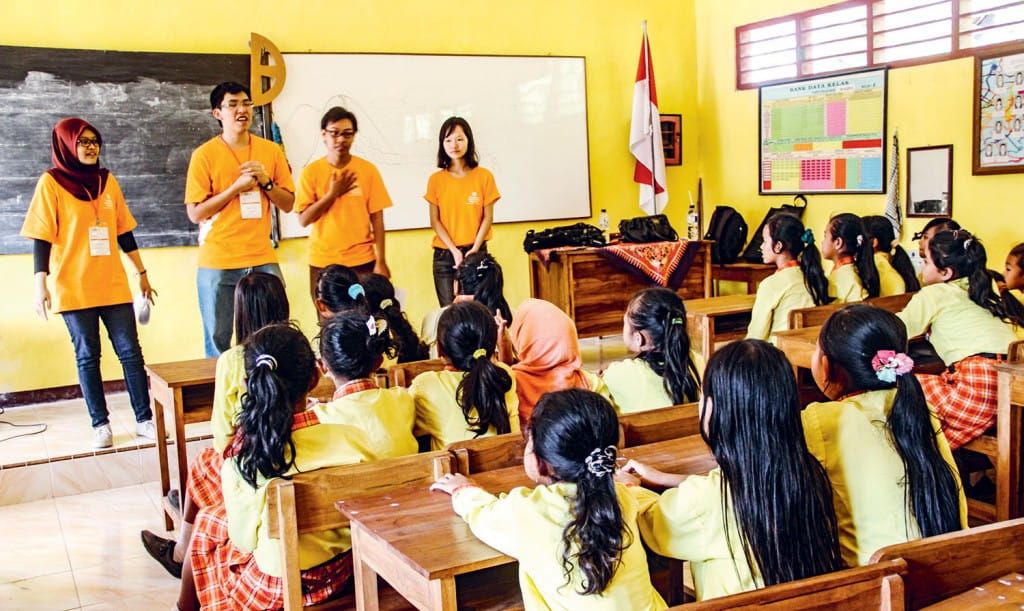
Singapore International Foundation facilitated an experiential learning session for Asian Undergraduate Summit (AUS) participants as part of its Water for Life project in Lamongan, Indonesia. Participants conducted hygiene and water security lessons for schoolchildren.
Young people in Singapore make friends for a better world by rallying other youth to tackle the world’s social challenges through debate and discussions on pertinent issues.
PHOTOS ASIAN UNDERGRADUATE SUMMIT, YALE-NUS COLLEGE ASIA PACIFIC MODEL UNITED NATIONS
In 2015, the students from the two tertiary institutions in Singapore started two programmes to bring together youth from around the world to debate and discuss the social challenges faced by the world today.
The first initiative is the Asian Undergraduate Summit (AUS), which gathers tertiary students from universities around Asia to discuss regional issues, learn about other cultures and make friends in the process.
It is organised by students from the NUS Students’ University Scholars Club.
The other programme, the Yale-NUS College Asia Pacific Model United Nations (YNC-AP MUN) conference, aims to inspire high school students around the world to take a proactive role in effecting change in the future through rigorous discourse over social, security, economic and humanitarian issues.
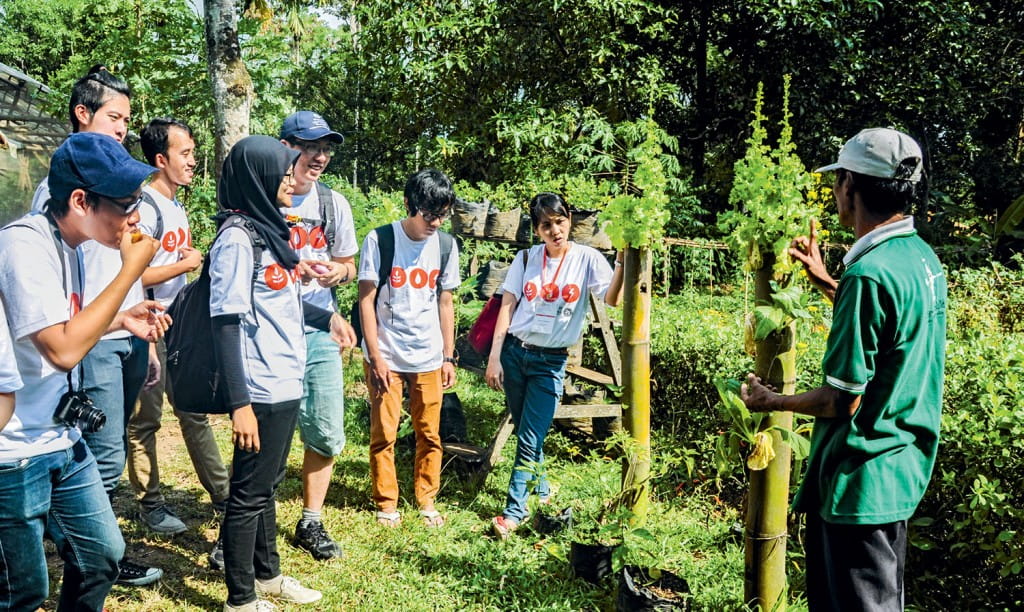
AUS participants learn about organic farming at the Environmental Education Center in East Java.
ASIAN UNDERGRADUATE SUMMIT
Working on the principle of an exchange, the AUS consists of two parts encompassing field trips, presentations and focus group discussions, as well as the sharing of insights and expertise from regional experts and government agencies.
In the first leg, NUS students team up into groups and are hosted to a five-day programme by fellow AUS participants from a partner university in Asia.
In the second leg, all AUS participants meet in Singapore for a week-long programme hosted by the AUS Organising Committee.
The first AUS was held from May to July 2015 and its theme was Leadership in a Complex World: The Food, Water and Energy Nexus. It drew 103 participants from around Asia. Of these, 48 were Singaporeans and the rest came from countries like China, Malaysia and Indonesia.
For the inaugural summit, NUS students linked with their peers from five partner universities around Asia: Ateneo de Manila University in the Philippines, Mahidol University in Thailand, Universitas Airlangga in Indonesia, Universiti Kebangsaan Malaysia and Vietnam National University – Ho Chi Minh City.
Goh Seng Chiy, 23, a third-year chemical engineering student at NUS, was the chairperson of the inaugural summit. On his motivations, he says: “As I strongly believe in being the change you want to see in the community, I decided to take up the challenge and organise a purely student-run international programme, by students, for students, which eventually evolved to become the AUS.
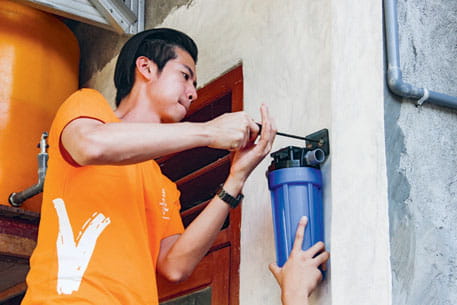
NUS law student Dillon Tan installs a water fi lter at a school in Lamongan.
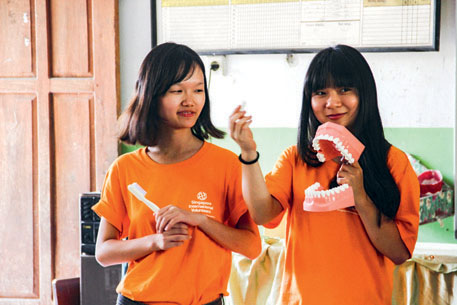
Two participants give lessons on dental hygiene to students at the school.
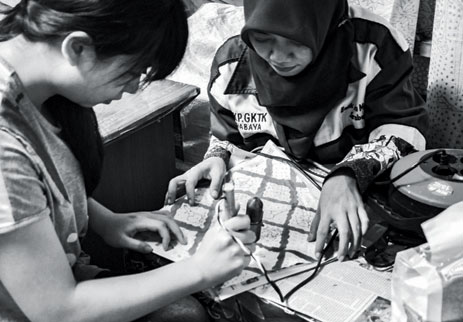
An NUS student (left) learns to sew traditional Indonesian batik handkerchiefs from a Universitas Airlangga student as part of the AUS programme in Indonesia.
Through the act of organising a purely student-run programme of this scale, I also hoped that more people would realise that they are empowered, that they each have agency to challenge the norm and spark change in the community and the world.”
Participants credited the AUS for providing a multi-dimensional view of the complexities surrounding food, water and energy issues in Asia.
The overseas visits helped them to experience the realities on the ground first-hand, and to talk to relevant parties.
Melvin Soh Chin Aik, 22, a secondyear life sciences student at NUS who visited Thailand under the AUS, says that it gave him a better understanding of Thailand’s perspectives, concerns, and planned solutions for food, water and energy issues.
He adds: “Through the conference, I had a better understanding of how different stakeholders, from companies to non-governmental organisations to consumers, interact with policies.
These interactions can have long-lasting ripple effects on downstream processes with unintended consequences.”
Fellow NUS student Cheong Yinn Shan, 20, a second-year geography and sociology student, says as much.
Cheong, who visited Kuala Lumpur and Manila under the AUS, says: “Interacting with students from other countries allowed me to understand the unique problems their countries face from a more humanistic perspective.
“What inspires me most is that youth from all over South-east Asia are very keen on combating climate change and I believe that our generation is even more equipped (than previous ones) with knowledge and the commitment to instil permanent change.”
“I (hope) that more people would realise that they are empowered, that they each have agency to challenge the norm and spark change in the community and the world.”
Undergraduate Goh Seng Chiy
NUS law student Dillon Tan, 24, who visited Surabaya in Indonesia, was impressed by the affinity that the locals had with their land. He says: “We learnt that many of the environmental projects in Surabaya were localised initiatives that depended on the passion and drive of local residents rather than on any topdown planning from the government. This is something that Singaporeans could do well to learn from.”
Recalling her experience, Aliena Mari P Miranda, 19, a third-year student studying applied physics and materials science and engineering at Ateneo de Manila University, says that one of her most memorable experiences from the AUS was staying up late with her group to work on their final presentation.
She adds: “Each group in the conference was made up of representatives from different countries and we all had different opinions about what the future would be and how we should prepare for it. It was just great working with people from different cultures because there’s a lot we can learn from each other.”
Preparations for the second AUS in 2016 are underway, with details to be announced soon.
YALE-NUS COLLEGE ASIA PACIFIC MODEL UNITED NATIONS
The inaugural YNC-AP MUN, held from Jan 23 to 25, 2015, saw some 1,000 high school students taking part. Half of them were from Singapore while the rest were from over 40 countries and territories, including the Middle East and Europe.
Held on Yale-NUS College’s campus in Singapore, the conference simulated the various committees of the UN by getting participants to act as delegates to debate and discuss various pressing issues faced by the world today.
These include security, social, economic and humanitarian issues.
Ajinkya Chougule, 22, a second-year student pursuing a degree in politics, philosophy and economics at Yale-NUS College was the deputy secretary-general of the first edition. He says that the idea for the YNC-AP MUN came from a group of 15 to 20 students at Yale-NUS College and NUS Law who wanted to give Singapore’s high school students an opportunity to interact with those from other countries and help promote the open exchange of ideas.
Despite the challenges in organising an event of such scale, Chougule says that it was gratifying to see the event come together and the participants make cross-cultural connections.
Conference participant and Thai student Matihya Chin, 16, from the Anglo Singapore International School in Bangkok, played the role of Somalia’s representative to the Arab League.
Apart from learning about teamwork and time management and gaining a better understanding of Somalia’s history, culture, people and foreign policy, her greatest takeaway was the friendships she made.
She says: “Although we were only together for four days, we were able to bond on both a personal and professional level. We were able to connect and communicate well despite certain cultural differences.
“I made a lot of new Singaporean friends and I still chat, Skype and connect with them on social media to this day. Singaporeans are very fun and easy to be around with.”
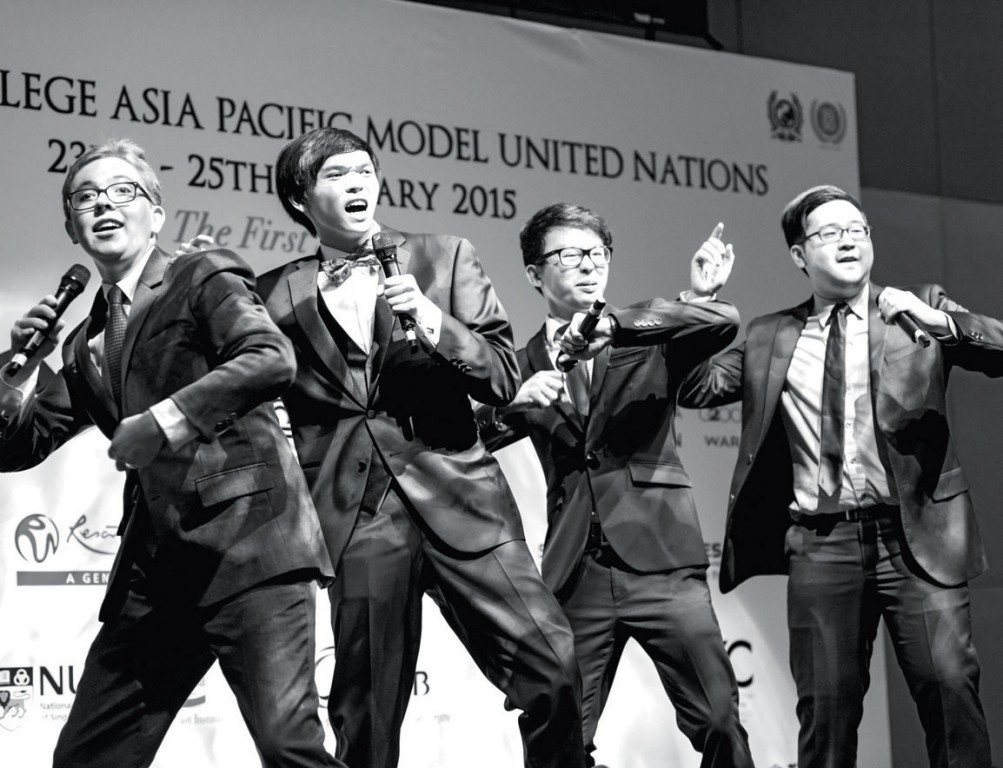
Students let their hair down during the closing ceremony of the Yale-NUS College Asia Pacifi c Model United Nations conference at Resorts World Sentosa.
Ultimately, participants come away from the conference with the understanding that complex issues affect all of humanity equally, and that it is only with international cooperation that one can even begin to solve them, says Chougule.
Following the success of the inaugural session, the second edition of the YNC-AP MUN will be held from Jan 22 to 24, 2016. Chougule, who is the Secretary-General of the second conference, says that it will be similar to the first in terms of the principles espoused, as well as the number and diversity of its participants, but that the topics to be discussed will be different.
For instance, it will feature more regional organisations, such as the European Union, the Arab League and the African Union, to help delegates understand that such regional groupings are as important as international organisations in making progress on some of the most pressing issues today.
VISIT HTTP://YNCAPMUN.YIRPA.ORG AND HTTP://AUS. NUSUSC.COM TO FIND OUT MORE ABOUT THESE INITIATIVES.
